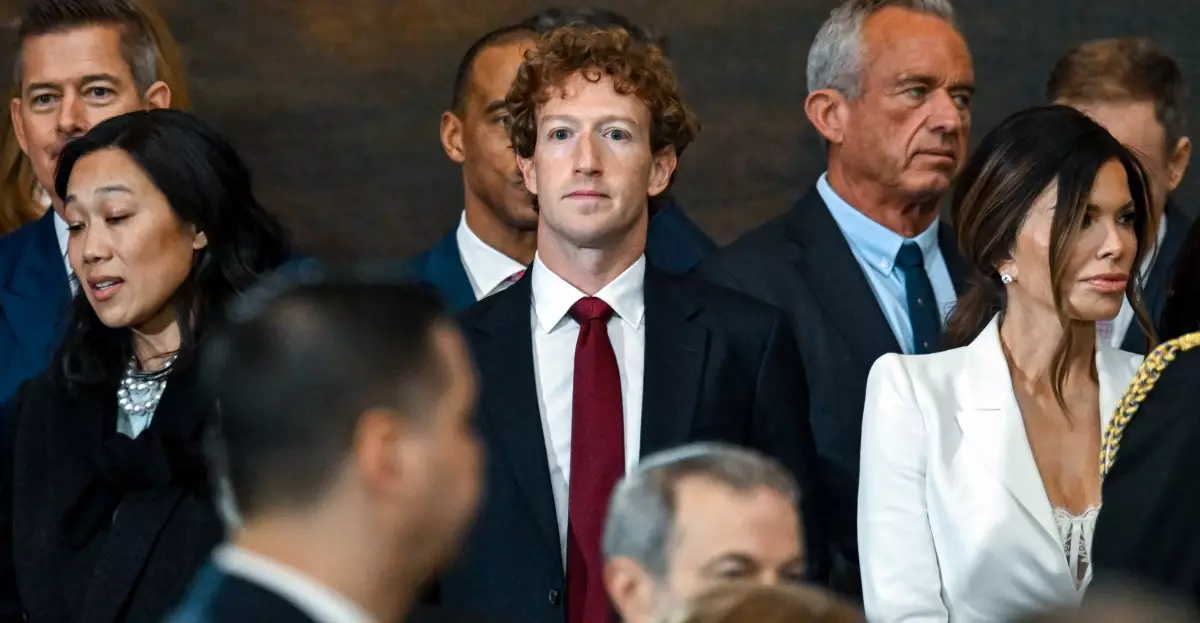As the European Union gears up to potentially impose hefty fines on Meta, the tech giant finds itself at a critical crossroads. Mark Zuckerberg, Meta’s co-founder and CEO, is not only wrestling with the ramifications of regulatory scrutiny but also engaging in an intricate dance of political alliances. Having fostered a close relationship with former President Donald Trump, Zuckerberg’s maneuvers may seem calculated as he seeks to mitigate the impending financial blow from European regulators.
The Underlying Concerns of the Digital Markets Act
The EU’s Digital Markets Act (DMA), enacted to enhance competition and prevent monopolistic practices within the tech sector, poses a significant challenge for Meta. The DMAs ruling against Facebook and Instagram’s controversial “pay or consent” advertising strategy has raised red flags. This model, which mandates that users either provide consent for personalized ads or face paid alternatives, has been criticized for infringing upon user rights. Preliminary rulings suggest that Meta’s practices are in violation of this law, which could result in penalties amounting to a staggering $16 billion – about ten percent of their anticipated annual revenue for 2024.
As the regulatory landscape evolves, Meta’s pushback becomes increasingly evident. Zuckerberg has publicly criticized the EU’s approach, labeling it as a mechanism of “institutionalized censorship” that stifles free speech and innovation in social media. This framing not only plays to a home audience that values individual liberties but also resonates with political leaders who share similar sentiments.
Zuckerberg’s Tightrope Walk: Influencing US Policy
Zuckerberg’s political strategy involves not just lobbying EU officials but also tugging on the avenues of power back in the United States. His close ties with Trump represent an investment in creating a safety net against potential EU backlash. Zuckerberg’s efforts include directing Meta executives to appeal to U.S. trade officials for support, demonstrating a proactive approach to navigating the regulatory minefield. Reports suggest that he even sought personal audiences with governmental leaders to underscore the gravity of Meta’s position.
The stakes are undeniably high. European revenue constitutes approximately a quarter of Meta’s total earnings, making the repercussions of stricter regulations an immediate concern. If changes to the advertising model are mandated, Meta could see a significant income drop, which Zuckerberg is keen to avoid at all costs. Thus, it is imperative for him to leverage his relationships to foster an environment conducive to Meta’s business, not just in terms of EU penalties, but also in crafting a narrative that minimizes reputational damage.
Strategic Board Changes and Corporate Policies
Under the pressure of regulatory scrutiny, Meta’s internal dynamics are changing as well. The recent appointment of UFC CEO Dana White, a vocal supporter of Trump, to Meta’s board of directors marks a notable shift in strategy. This move reflects a growing trend within the organization to align more closely with principles and figures that parallel Trump’s ideologies, including a dismissal of third-party fact-checkers and a focus on more robust corporate communication tactics.
This alignment with controversial figures and policies raises significant ethical questions. Critics argue that by sidelining diversity initiatives and promoting narratives aligned with Trump’s contentious rhetoric, Meta risks crippling its long-term credibility and undermining the core values of inclusivity and integrity that are essential for sustained user trust. Moreover, Zuckerberg’s choices could erode brand loyalty among users who are increasingly wary of corporate ethics and responsibility.
The Impending EU Decisions and Future Prospects
As the EU inches closer to its decision regarding the potential fines, all eyes are on how effective Zuckerberg’s alliances and lobbying will prove to be. The political chess game being played not only reveals the intricate interplay between tech giants and government entities but also underscores the larger narrative of corporate responsibility versus economic gain. While Zuckerberg might hope that his strategic positioning can buffer the onslaught of financial penalties, the implications of his tactics could reverberate far beyond the immediate confrontation with the EU.
The evolving relationship between technology companies and regulatory bodies sets a precedent for future interactions. It begs the question: will the tactics employed by Zuckerberg serve as a roadmap for other CEOs navigating a similar plight, or will it underscore the dangers of intertwining corporate interests with political alliances? We are left to ponder how this saga will unfold and what it means for the future of digital governance.


Leave a Reply
You must be logged in to post a comment.